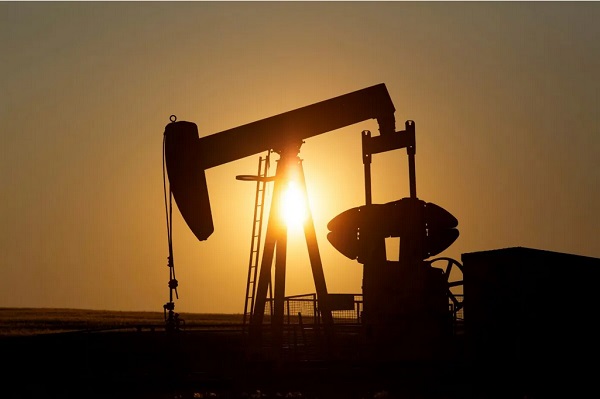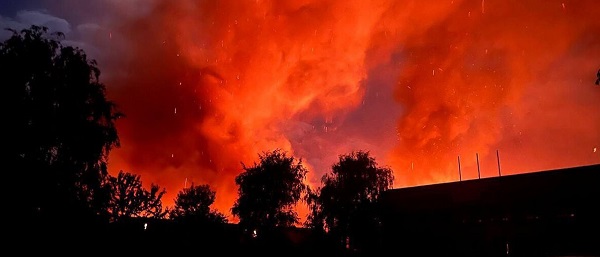conflict
Energy Security in a Turbulent World: Canada’s Moment to Lead

From the Frontier Centre for Public Policy
By Terry Etam
Autos are different than maple syrup, which is different than oil, which is different than natural gas…Ottawa, get out of that freaking UN playpen, we have issues here.
Want an example of how upside down the whole world is? Consider these two quotes, retrieved from the web this past weekend, about whatever the hell is going on in Syria:
“There are posts on X discussing this event, with some suggesting that Assad might have fled to Moscow, though these should be treated with caution as social media can spread unverified information. Official state responses or confirmations from the Syrian government were not detailed in the provided sources… This situation reflects the ongoing instability in Syria, where despite years of conflict, the dynamics can still shift dramatically. However, without more concrete details or official statements, the full implications and the veracity of the breach into Assad’s palace remain to be fully assessed.”
“The Assad regime’s ongoing refusal to engage in the political process outlined in UNSCR 2254, and its reliance on Russia and Iran, created the conditions now unfolding, including the collapse of Assad regime lines in northwest Syria. At the same time, the United States has nothing to do with this offensive…”
Now isn’t that interesting, hey? The best and the worst of social media – a voice of calmness and reason, and an inflammatory one of accusations and denial. One statement urging caution and suspicion of social media; the other hurling accusations and the sort of militant and overly simplified claims that sadly seem to be the hallmark of extremism.
Here’s the funny part: the first calm comment originated from… X’s AI machine Grok, which collates mass data from X, formerly Twitter, the “unhinged right wing platform” which many decry it as. The second inflammatory one originated from – the White House. In whom shall we trust…?
Chaos reigns supreme around the world, and there simply isn’t enough reliable information to leap to significant conclusions. Trump’s recent tariff announcements fit squarely into this mayhem, where the right answer to what will happen is: “No one has any idea where these will lead, including most certainly not Trump.”
It’s hard to catalogue it all, but here goes an attempt to capture some of the most pertinent brick-in-a-washing-machine situations, to possibly guide toward a plausible outlook for the energy industry. If that – a plausible outlook – sounds like a wet-noodle conclusion, well, it is. It should be quite evident that any sort of dead certainty is the realm of fools
Consider all this mayhem unfolding, particularly in comparison to the dreamy world of the 1990s when the Berlin Wall had fallen, and we were all flitting about with flowers in our hair discussing the “peace dividend”.
Today we have:
A global movement to advance the BRICS initiative (Brazil, Russia, India, China, and South Africa), a more-than-significant group of nations that is, for the first time in centuries, looking to carve a future for its mostly ‘developing-nation-status’ participants that is, as India says, not anti-western but non-western. The aligned BRICS nations contain over 3 billion people, which is climbing as more nations seek to join, with a combined GDP of over $30 trillion. These nations do not share the West’s devotion to moralistic causes; they are hungry and want to eat, they want refrigerators and cars, and they want to stop burning dung in their kitchens.
Multiple, simultaneous wars have ensnared the weirdest alignment of countries that may lead to unpredictable outcomes. Let’s start with the poster child for bang-bang bingo, the Middle East. We have…Israel not just fending off but looking to wipe out terrorist organizations that operate in Lebanon, Gaza, Yemen, Qatar (until just a few weeks ago, apparently), and Lord knows where else. All those terrorist organizations trace back to a central head in Iran, who is no doubt in Israel’s crosshairs. Based on this conflict, nations have been forced to align with the Israeli side, or the Iranian side if said nation is close to any one of the tentacles of the Iranian complex.
Now at the same time, Iran is supplying weapons to Russia, which is waging another war that multiplies the minefield of geopolitical relations. China is supporting Russia and, thereby, a de facto supporter of Iran, or kind of, and both support North Korea for some crazy reason. So, by way of association, anyone looking to join the BRICS group is in some way sanctioning what Iran and Russia are doing, including, as Trump called him one upon a time, Little Rocket Man. But Orange Man Bad and Little Rocket Man get along very well, even though this is structurally impossible based on history, and on last year’s ‘rock solid’ alliances.
Now consider that countries like Saudi Arabia, Thailand, Malaysia, and Vietnam have either expressed interest in joining BRICS, or are on their way to membership (the United Arab Emirates has now actually joined). These are significant entities because they are significant trading partners with the US (and the US/west is fully dependent on China anyway for metals/minerals processing, a situation that seems to have yet to fall into the West’s consciousness. What is the West to do when valuable trading partners decide they’d rather join Satan and the Communists’ trading block, rather than the open-if-hectoring arms of the wealthy West?
In a new development, Trump announced 100 percent tariffs on BRICS if they did not make efforts to trade in a manner that would challenge the USD’s status as the global reserve currency. This is even though the US economy is deeply entwined with many countries in BRICS, and these tariffs would rock the US and its voters to the core (with more elections coming up in two years, all this must resolve quickly or boom, there goes the balance of power again).
Now, let’s look at how the madness has permeated the world of energy. We have a new US president who announced tariffs of 25% on any goods from Canada (oil? Who knows?) and who also said he would prefer to see Keystone XL built, thereby increasing the volume of the product he is seeking to keep out via tariffs…? He has pledged to cut American energy prices in half and promote ‘drill baby drill” while cutting oil prices in half will decimate any producer’s desire to “drill baby drill”.
That’s just in the US. Look at what happened at COP29, where the host country’s president apparently used the conference as a networking event to cement more oil and gas production deals. Later in the conference, an OPEC minister took the stage – mere days after the UN Secretary General’s tiresome wailing about the mortal danger we are all in due to the combustion of fossil fuels – to declare that oil was “a gift from God.” Throw all that into a pot, and surprise, surprise, the final conference statement of progress read like a kid’s soliloquy on why his bedroom was such a disaster –but don’t worry, it will never happen again. In other words, just a bunch of jibber jabber, if for no other reason than to cloak that 70,000 freaking people jetted around the world to a remote location to study the suicidal impact of people flying around the world to remote locations. (And climate conferences manage, if nothing else, to land tens of thousands of people in every exotic destination in every corner of the world, all flown in, to shout vigorously about among other things, the ecological horror that is flying. It’s all too funny for words.)
We have Europe on its industrial knees, Germany in particular, because it shut down all its clean baseload energy sources (nuclear) and stopped buying its life blood fuel – natural gas – from Russia because, and here we go again right back into the swamp, of Russia’s invasion of Ukraine. German industrial output is in freefall, auto manufacturers are bleeding red ink because they are forced to limit sales of the cars people want – internal combustion engine ones – because German policy dictates that electric vehicles must make up a specific percentage of sales. Despite Germany’s formidable engineering prowess, the simple observation that if no one buys EVs, no automaker will sell any ICEs – that’s how a forced EV proportion of sales works – and everything crumbles as a result. Volkswagen is looking to shut down German manufacturing plants for the first time ever. It is a crazy industrial policy.
We are now seeing a pushback against the rushed energy transition/net-zero-whenever agenda that is far beyond my imagination (and my imagination is big) because the inevitable has happened – it is hitting people’s pocketbooks. In the latest very big news on that front, the state of Texas is suing BlackRock, State Street, and Vanguard for illegally conspiring to manipulate energy markets and drive-up costs for consumers. Texas Attorney General’s office issued a news release stating: “Over several years, the three asset managers acquired substantial stockholdings in every significant publicly held coal producer in the United States, thereby gaining the power to control the policies of the coal companies. Using their combined influence over the coal market, the investment cartel collectively announced in 2021 their commitment to weaponize their shares to pressure the coal companies to accommodate “green energy” goals. To achieve this, the investment companies pushed to reduce coal output by more than half by 2030.” The Attorney General argues that efforts to restrict coal power have led to increased electricity costs across the United States, resulting in significant revenue gains for the investment companies that hold shares in these firms. Additionally, the news release claims that these companies misled thousands of investors who chose to invest in non-ESG (Environmental, Social, and Governance) funds, aiming to maximize their profits. Despite their claims to the contrary, these funds implemented ESG strategies. Notably, ten other states have joined the lawsuit.
While that is all unfolding, Trump’s threat of a 25 percent tariff on imports of Canadian and Mexican goods could include oil and natural gas. Given that the North American energy market is hugely intertwined, and that natural gas is quite different than oil (gas is to a certain extent a two-way street – for every 3 GJ of natural gas that Canada exports to the US, the US exports 1 to Canada), there is much complexity here to unpack, and I’m not sure anyone is able to… There are many levels of analysis here – economic, political, geopolitical, retaliatory, defense (Are NATO commitments met? Silence from the Canucks), and there isn’t any indication that either Canada or the US grasps the full nationwide repercussions. Autos are different than maple syrup, which is different than oil, which is different than natural gas…Ottawa, get out of that freaking UN playpen, we have issues here.
The most recent feedback out of Canada’s tariff situation, the reports of the conversations between the two leaders, indicate that in the short term, the tariffs are unavoidable until “the US balances its budget.” No one knows what that means, and assuming the worst isn’t a bad idea because nothing is very stable these days. Having said that, tariffs on oil and gas are going to be chaotic, to put it mildly, if for no other reason than the US needs Canadian crude grades that it cannot produce in the short term, and because the US exports natural gas to Canada in significant quantities.
And that’s just the North American perspective. Globally, we are in severe turmoil as well. We have policymakers who cannot comprehend the very basic math involved in the quantities of energy the developing world will want, and at the very same time those Western policymakers are overseeing the maddest race ever to thrive in the AI and crypto mining spaces, both of which are power hogs of unimaginable proportions because each embeds an unusual feedback loop whereby the more power is consumed, the better these things perform, and the more profitable they are, so guess what happens.
Back here in Canada, some excellent thinkers are pointing out that this country needs to start thinking at a somewhat higher level on the energy file at least, such as Heather Exner-Pirot pointing out in the Calgary Herald that Canada should be looking at reviving Keystone XL and Northern Gateway. The article also discusses how we should be accelerating LNG export development. These are excellent points – we need to take control of our energy destiny to the extent possible. Trudeau’s rushed visit to Florida to plead Canada’s case was a stark and somewhat embarrassing display of exactly what the power relationship is here.
Maybe the US election will also be sufficiently jarring in Canada to cause a thunderclap in the hallways in Ottawa on the energy file. Canada is an energy powerhouse – oil, natural gas, nuclear, hydro, renewables where they work, it is a minerals powerhouse, it has world-class agricultural and manufacturing prowess…the list goes on and on.
The world is demonstrably uncertain, but in the chaos is opportunity. Nationally we have become preoccupied with trivialities and attempting to solve the world’s problems – from a point of view that doesn’t even understand them in the first place.
The US election is a wake-up call to Canada, and many other countries as well – stop playing games, stop acting as though elected officials and an army of bureaucrats are our moral compass, and get back to governance; put your thinking hats on like hasn’t been done for a while; focus on strengths; get our own house in order before lecturing the world. Do right by the people that voted for you, not your perceived legacy.
Few countries are as blessed as Canada with pretty much everything. Time to get off our back foot.
Terry Etam is a columnist with the BOE Report, a leading energy industry newsletter based in Calgary. He is the author of The End of Fossil Fuel Insanity. You can watch his Policy on the Frontier session from May 5, 2022 here.
Artificial Intelligence
AI Drone ‘Swarms’ Unleashed On Ukraine Battlefields, Marking New Era Of Warfare


From the Daily Caller News Foundation
Artificial intelligence-powered drones are making their first appearances on the battlefield in the Russia-Ukraine war as warfare creeps closer to full automation.
In bombardments on Russian targets in the past year, Ukrainian drones acting in concert were able to independently determine where to strike without human input.
It’s the first battlefield use of AI “swarm” technology in a real-world environment, a senior Ukrainian official and Swarmer, the company who makes the software, told the Wall Street Journal in a Tuesday report. While drones have increasingly defined modern battlefields, swarms until now had been confined to testing rather than combat.
“You set the target and the drones do the rest,” Swarmer Chief Executive Serhii Kupriienko told the WSJ. “They work together, they adapt.”
So far, the Swarmer technology has been used hundreds of times to target Russia assets, but was first used a year ago to lay mines on the front, the Ukrainian official told the WSJ. The software has been tested with up to 25 drones at once, but is usually utilized with only three.
Kupriienko told the WSJ that he was preparing to test up to 100 drones at once with the linking software.
A common arrangement used on the battlefield includes one reconnaissance drone to scout out the target and two explosive drones delivering the payload on target, the official told the WSJ.
While Western nations such as the U.S., France and the United Kingdom are also pursuing drone swarm technology, they have not deployed swarm technology on the battlefield the way Ukraine has, according to the WSJ. Currently, autonomous weapons are not regulated by any international authority or binding agreement, but ethical concerns around the technology has led many to call for increased regulation of weapons like the Swarmer system.
The Ukrainian Ministry of Foreign Affairs did not immediately respond to the Daily Caller News Foundation’s request for comment.
conflict
Trump Pentagon Reportedly Blocking Ukraine From Firing Western Missiles Deep Into Russia


From the Daily Caller News Foundation
The Department of Defense has spent months blocking the Ukrainian military from using American and British-made missiles to hit targets deep inside Russia, The Wall Street Journal reported Sunday, citing unnamed U.S. officials.
Undersecretary of Defense for Policy Eldridge Colby reportedly designed the procedure to review requests to carry out the long-range strikes with weapons that are either of U.S. origin or that require American intelligence or use components provided by the U.S., according to the WSJ. Secretary of Defense Pete Hegseth reportedly has the final say on whether Ukrainian forces can use the MGM-140 ATACMS (Army Tactical Missile System) to hit targets in Russia.
The reported blocks on missile strikes coincides with a Trump administration effort to broker a peace deal between Russia and Ukraine. A Pentagon spokesperson declined to comment further on the matter.
BREAKING: President Vladimir Putin reacts to B-2 Flyover pic.twitter.com/1mzVn7DxlW
— Jack Poso 🇺🇸 (@JackPosobiec) August 15, 2025
The Biden administration allowed Ukraine to carry out strikes with ATACMS in November, weeks after President Donald Trump won the 2024 election, the New York Times reported. Trump criticized the move during a December interview with Time magazine.
“It’s crazy what’s taking place. It’s crazy,” Trump said. “I disagree very vehemently with sending missiles hundreds of miles into Russia. Why are we doing that? We’re just escalating this war and making it worse. That should not have been allowed to be done.”
Trump and Russian President Vladimir Putin met in Alaska on Aug. 15 for a summit meeting during which Trump sought to secure a cease-fire in Russia’s war with Ukraine. As Trump greeted Putin, a B-2A Spirit stealth bomber and several fighters carried out a flyover of Elmendorf Air Force Base.
Trump met with Ukrainian President Volodymyr Zelensky and major European leaders on Aug. 18 to update them on the summit.
In July, Trump reached an agreement with NATO where members of the alliance would purchase weapons, including MIM-104 Patriot surface-to-air missiles, and donate them to Ukraine.
-

 Energy23 hours ago
Energy23 hours agoCanadians will soon be versed in massive West Coast LPG mega-project
-

 Alberta1 day ago
Alberta1 day agoKeynote address of Premier Danielle Smith at 2025 UCP AGM
-

 Alberta2 days ago
Alberta2 days agoNet Zero goal is a fundamental flaw in the Ottawa-Alberta MOU
-

 Food2 days ago
Food2 days agoCanada Still Serves Up Food Dyes The FDA Has Banned
-

 Addictions2 days ago
Addictions2 days agoManitoba Is Doubling Down On A Failed Drug Policy
-

 National2 days ago
National2 days agoEco-radical Canadian Cabinet minister resigns after oil deal approved
-

 COVID-192 days ago
COVID-192 days agoFDA says COVID shots ‘killed’ at least 10 children, promises new vaccine safeguards
-

 Daily Caller24 hours ago
Daily Caller24 hours agoTom Homan Predicts Deportation Of Most Third World Migrants Over Risks From Screening Docs




